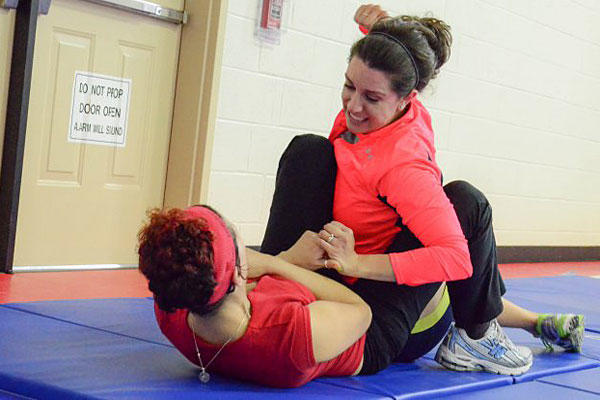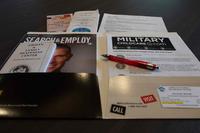Attackers fear failure. That is why lions attack weak gazelles. Terrorists prefer defenseless targets. Rapists sometimes "interview" their prey to see if they will submit.
As part of my work for the private security firm Gavin De Becker and Associates, one of the most important things we do is to teach women to make themselves hard targets. We want women to look like crocodiles to potential attackers, not gazelles.
As a former Marine, I know this is especially important for military spouses and girlfriends like you to keep in mind during your service member's deployment. You might be alone more often, but this doesn't have to mean that you are more vulnerable.
Instead, you can make yourself a hard target. Walk with a purpose, and when you are alone don't appear weak.
Speak with authority when a stranger approaches and never negotiate your own security with a stranger in the name of politeness. Avoid soft responses like "maybe." Or "Sorry." Or "I think I've got it." Instead, you need to be firm and say "No."
You can practice this skill by looking at this scenario: Picture yourself exiting the grocery store after a long day at work.
It is after dark and you are lugging heavy grocery bags toward your car. You fish for your keys, pop the trunk. Then you hear a male voice say, "I'll help you with that."
You freeze. Though his voice and his offer seem objectively normal, an uncomfortable pause still cripples your breath.
You might be thinking, This is bad. It doesn't feel right, I just want to get in my car, lock the doors, and escape this dark parking lot.
As you vibrate with fear, do you respond to the stranger with a smile and "Ah, no thanks, I got it?"
What do you do when the stranger steps even closer and says, "C'mon, those bags are heavy?" What if he grabs a bag and smirks, "You bought cat food. I'll bet you live alone."
What do you do? Do you relent and give him more control of the situation?
This is the moment that divides the crocodiles from the gazelles. This is the moment that the fear you feel is your signal to respond with power because, more than anything else, attackers fear failure.
When I deal with clients, I teach that you need to turn toward this stranger, raise both hands in the stop position, and say firmly, "No. I don't want your help!"
You don't give him an inch or let him gain more control. You turn your No! into a complete sentence and take charge of your personal safety. You let him know you are not a soft target.
No is not a negotiation and it's often not polite. No is powerful. It is your line in the sand. No delivered like this says, "I'm not an easy target. Now go away."
Next time you really do need help with your grocery bags or anything else, don't wait for help, ask for help -- and I recommend that women ask other women for help.
Finally, remember that No is a complete sentence pronounced with strength and power -- not politeness or negotiation.
As a military spouse, it is important that you learn more about keeping yourself safe and avoiding danger. I recommend reading the national bestseller, The Gift of Fear. It can give you the confidence of No when you need it most.
-- Ed Hinman is the Director of Recruitment, Selection, and Training at Gavin de Becker & Associates, a private security firm based in Los Angeles, providing threat assessment and executive protection for the nation's most at-risk public figures and organizations. A graduate of the United States Naval Academy, Hinman served eight years in the United States Marine Corps before beginning his security career in Los Angeles.





























